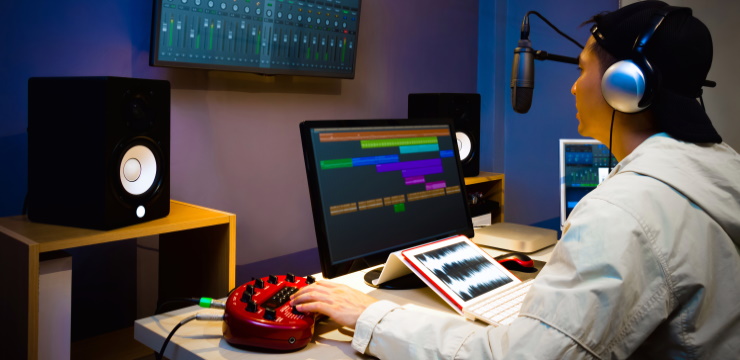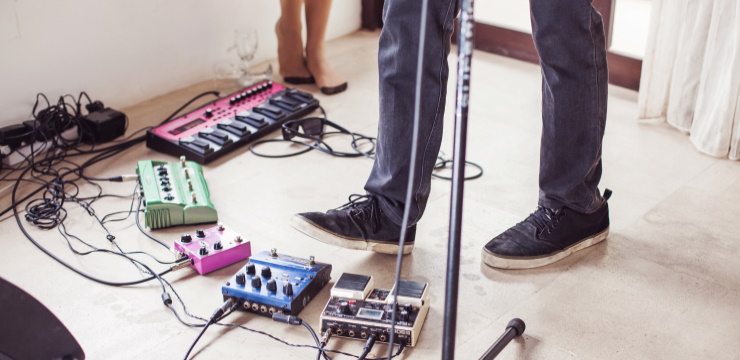A vocal processor can modify the voice with a multitude of effects to change its pitch, range, clarity, or special effects. Any musician knows the importance of vocals on a track. They need to be in perfect harmony and on key.
In addition, mistakes and flaws in vocals are the easiest to spot. If you wish to sound as polished and in harmony as your favorite singer, then you might want to pick up a vocal processor. These devices perform a wide variety of functions. The functions can be as simple as adding a few finishing touches to something or as complex as making it sound like an extravagant choir.
There are a wide variety of vocal processors in the market, ranging wildly in price. You can easily start off with something mediocre and cheap, and then make your way up to the top.
Contents

A vocal processor is to your voice as Photoshop is to your pictures. The only difference is that it adds effects while you sing and not after you’re done. The device adds various effects to your voice that enhance its qualities. This can include adding echo, reverb or doubling your voice. If you're interested in purchasing one check out our buying guide and reviews for the best vocal processors.
Furthermore, the device features a corrector that rectifies the pitch of your voice so it matches the key of the music. With a vocal processor, you can pre-record harmonies or riffs and then loop them in during the live singing. This lends depth and bulk to your vocals and makes the track sound more polished.
The vocal processor is a crucial device for solo performers who do not have any backup singers. Even rappers can include the device to play when they need to take a breath.
Not only this, but it can also change the character of your voice. You can sound like a child, your opposite sex, or an old lady with the press of a button. It may allow you to enact a whole musical by yourself. Of course, this is more for fun than enhancing the quality of your vocals.
The device basically takes input through your microphone and runs it through its processor. The finished product is then relayed through your speakers or the mixing board. It used XLR cables to transmit the input and the output.
A vocal processor is for any vocalist who needs to improve his or her live singing. Live performers can heavily benefit from it as it increases their voice quality and helps them remain on key. Furthermore, solo artists who do not have a sound engineer or backup singers can benefit the most.
Some individuals believe that a vocal processor is an easy way out for vocalists. Auto-tune has been popularized by most mainstream artists. Fans are often shocked to notice the vast differences between on-stage performances and their impromptu, unedited performances.
This often leads people to believe that these artists don’t deserve the career and the fame they have achieved. Some even argue that using such devices inhibit vocal growth.
While going overboard on the vocal effects can definitely lead to unnatural-sounding voices, the vocal processor is there to help artists out in tough times. Vocal artists often struggle to control their pitch. The artists’ nerves can also play a role during their performances, making their voices uneven or flat.
Also, no matter how perfect an artist is, they might face lows with their voice sometimes. Perhaps they are sick and cannot transition smoothly. Imagine going to a Madonna concert only to be disappointed by her straggly vocals just because she is sick.
Famous singers such as Cher and T-Pain have used digital devices to enhance their voices, resulting in truly astounding soundtracks. The key is not to heavily rely on the processor. This way you can touch up your voice without it sounding too robotic.
With so many available vocal processors in the market, how do you choose the best one for yourself? You might want to consider buying a multiple effects processor which amalgamates all the features and effects into one small device.
We recommend you consider the following features when buying a vocal processor:
This effect allows you to add multiple harmonies and backup vocals to your live performance.
One of the most important features is the pitch correction. It ensures that your voice is hitting all the right notes.
Some vocal processors optimize your voice with the guitar or the piano. These dedicated outputs and inputs allow you to plug in multiple microphones at the same time.
Looping adds bulk and gain to your voice to make it sound louder.
For the mic and other instruments.
These are the basic features but we recommend that you look for other advanced features such as radio, chorus, megaphone, delay, and echo.

The vocal processors available in the market might include different effects and construction. They can still be boiled down to three different types. These are Tabletop, Pedal or Mountable processors.
The type you choose depends on the type of set up you have. DJs and other EDM performers probably prefer the tabletop version since they are easier to use. Moreover, they don’t involve any kind of setups. Also, DJs and EDM musicians don’t use other musical instruments while singing.
Mountable processors are perfect for those solo artists who prefer to add effects themselves. You can simply attach it to your mic and operate it while you sing.
Pedal processors are best for those who use other instruments such as a guitar. They allow you to multi-task so you can sing, play the guitar and add effects to your vocals at the same time.
Vocal processors can be saviors for vocalists who need more bulk or finishing touches to their vocals. While they may be shrouded with controversy, no mainstream artist performs live without one. If you are just beginning on your road to stardom, try out some cheap vocal processors to find out which is best to help take your vocals to the next level.
Copyright © 2024 MSpot. All rights reserved. Privacy Policy & Cookie Disclaimer.
mspot.com is a participant in the Amazon Services LLC Associates Program, an affiliate advertising program designed to provide a means for sites to earn advertising fees by advertising and linking to Amazon.com. As an Amazon Associate, we earn from qualifying purchases.